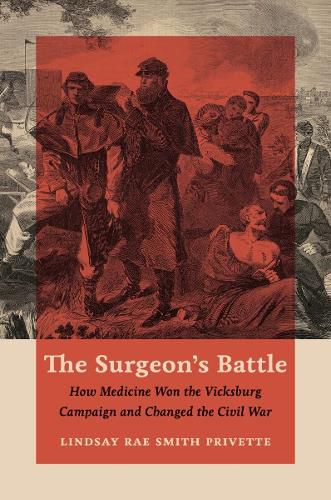Readings Newsletter
Become a Readings Member to make your shopping experience even easier.
Sign in or sign up for free!
You’re not far away from qualifying for FREE standard shipping within Australia
You’ve qualified for FREE standard shipping within Australia
The cart is loading…






Between May and May 22, 8 3, Union soldiers marched nearly 2 miles through the hot, humid countryside to assault and capture the fortified city of Vicksburg, Mississippi. Upon its arrival, the army laid siege to the city for a grueling forty-seven days. Disease and combat casualties threatened to undermine the army's fighting strength, leaving medical officers to grapple with the battlefield conditions necessary to sustain soldiers' bodies. Medical innovations were vital to the Union victory. When Vicksburg fell on July 4, triumph would have been fleeting if not for the US Army Medical Department and its personnel.
By centering soldiers' health and medical care in the Union army's fight to take Vicksburg, Lindsay Rae Smith Privette offers a fresh perspective on the environmental threats, logistical challenges, and interpersonal conflicts that shaped the campaign and siege. In doing so, Privette shines new light on the development of the army's medical systems as officers learned to adapt to their circumstances and prove themselves responsible stewards of soldiers' bodies.
$9.00 standard shipping within Australia
FREE standard shipping within Australia for orders over $100.00
Express & International shipping calculated at checkout
Between May and May 22, 8 3, Union soldiers marched nearly 2 miles through the hot, humid countryside to assault and capture the fortified city of Vicksburg, Mississippi. Upon its arrival, the army laid siege to the city for a grueling forty-seven days. Disease and combat casualties threatened to undermine the army's fighting strength, leaving medical officers to grapple with the battlefield conditions necessary to sustain soldiers' bodies. Medical innovations were vital to the Union victory. When Vicksburg fell on July 4, triumph would have been fleeting if not for the US Army Medical Department and its personnel.
By centering soldiers' health and medical care in the Union army's fight to take Vicksburg, Lindsay Rae Smith Privette offers a fresh perspective on the environmental threats, logistical challenges, and interpersonal conflicts that shaped the campaign and siege. In doing so, Privette shines new light on the development of the army's medical systems as officers learned to adapt to their circumstances and prove themselves responsible stewards of soldiers' bodies.